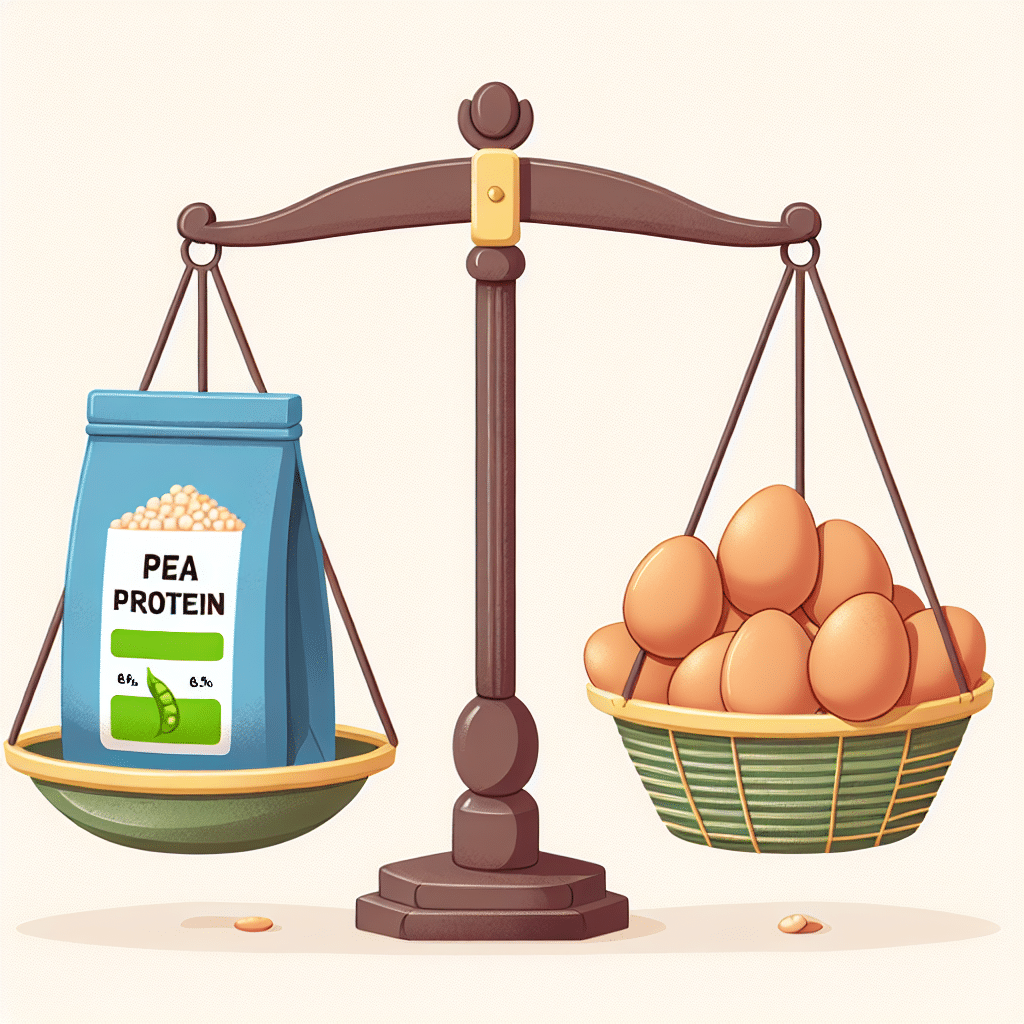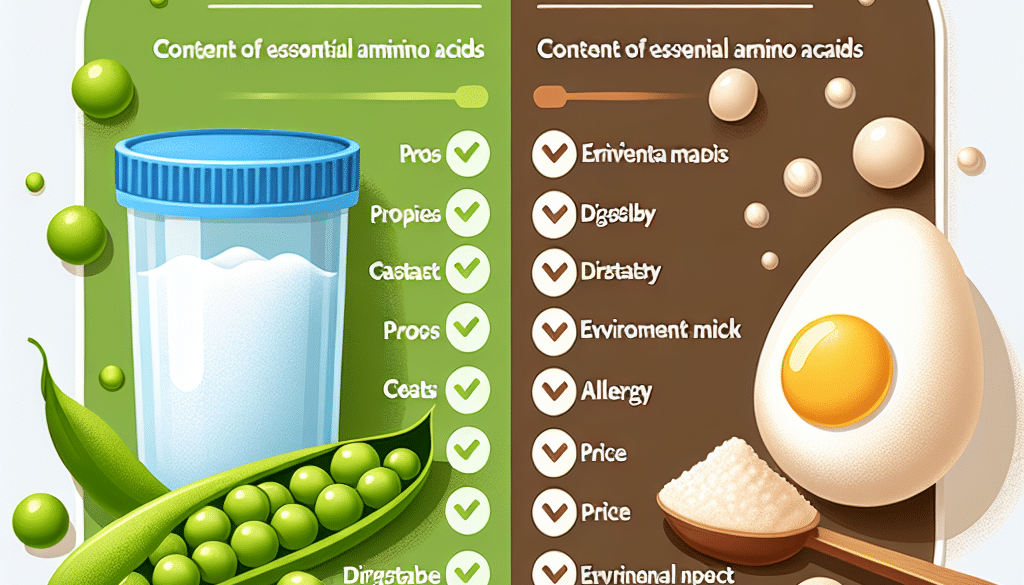Is pea protein better than egg?
-
Table of Contents
- Pea Protein vs. Egg Protein: Which is the Superior Choice?
- Understanding Protein Quality
- Egg Protein: The Gold Standard?
- Pea Protein: The Plant-Based Contender
- Comparing Nutritional Profiles
- Allergies and Dietary Restrictions
- Environmental Impact
- Texture and Taste
- Use in Muscle Building and Weight Management
- Case Studies and Research
- Conclusion: Making the Right Choice for You
- Discover ETprotein’s High-Quality Protein Products
Pea Protein vs. Egg Protein: Which is the Superior Choice?

When it comes to protein supplements, the debate between plant-based and animal-based sources is ongoing. Two popular contenders in this arena are pea protein and egg protein. Both have their unique benefits and drawbacks, and choosing between them can depend on various factors such as dietary restrictions, health goals, and environmental concerns. In this article, we will delve into the specifics of pea protein and egg protein to determine which might be the better option for you.
Understanding Protein Quality
Before comparing pea and egg proteins, it’s essential to understand what makes a protein source ‘high quality.’ Protein quality is often measured by its amino acid profile and digestibility. A complete protein contains all nine essential amino acids that the body cannot produce on its own. Digestibility refers to how well the body can absorb and utilize the amino acids.
Egg Protein: The Gold Standard?
Egg protein has long been considered the gold standard of protein quality. Eggs contain all nine essential amino acids and have a high biological value, meaning the body can efficiently use the protein it provides. Egg protein is also rich in vitamins and minerals, including vitamin B12, riboflavin, and selenium.
- Complete amino acid profile
- High biological value
- Rich in vitamins and minerals
Pea Protein: The Plant-Based Contender
Pea protein is derived from yellow split peas and has gained popularity as a plant-based alternative to animal proteins. It’s nearly a complete protein, though it’s slightly lower in methionine and cysteine compared to eggs. However, pea protein is still highly digestible and has a good amino acid profile, making it a strong competitor in the protein supplement market.
- Almost complete amino acid profile
- High digestibility
- Plant-based and allergen-friendly
Comparing Nutritional Profiles
When comparing the nutritional content of pea protein and egg protein, it’s important to consider your dietary needs and restrictions. Egg protein is higher in certain nutrients but also contains cholesterol and more saturated fat than pea protein. On the other hand, pea protein is often enriched with iron and is naturally cholesterol-free and lower in fat.
Allergies and Dietary Restrictions
Egg allergies are one of the most common food allergies, especially in children. For those with egg allergies or sensitivities, pea protein offers a safe alternative. Additionally, pea protein is suitable for vegetarians and vegans, while egg protein is not.
Environmental Impact
The production of plant-based proteins generally has a lower environmental footprint compared to animal-based proteins. Pea protein production requires less water and land and generates fewer greenhouse gas emissions than egg production. For environmentally conscious consumers, pea protein may be the more sustainable choice.
Texture and Taste
The texture and taste of protein supplements can be a deciding factor for many. Egg protein tends to have a smoother texture and a more neutral taste, which can be preferable in shakes and baking. Pea protein has a distinct taste and texture that some may find less palatable, but advancements in processing have improved its sensory qualities.
Use in Muscle Building and Weight Management
Both pea and egg proteins are effective for muscle building and weight management. The high-quality protein they provide can help in muscle repair and growth. Pea protein, in particular, has been shown to be just as effective as whey protein in building muscle mass, according to some studies.
Case Studies and Research
Several studies have compared the effects of different protein sources on muscle synthesis and overall health. For instance, a study published in the Journal of the International Society of Sports Nutrition found that pea protein supplementation could promote muscle thickness gains just as effectively as dairy-based proteins.
Conclusion: Making the Right Choice for You
Ultimately, whether pea protein is better than egg protein depends on individual needs and preferences. Egg protein offers a slightly superior amino acid profile and is a tried-and-true option for many. However, pea protein is an excellent alternative for those with dietary restrictions, allergies, or environmental concerns. Both can support muscle building and weight management effectively.
When choosing a protein supplement, consider factors such as nutritional content, dietary restrictions, environmental impact, and personal taste preferences. It’s also important to look at the bigger picture of your diet and lifestyle to make the best choice for your health.
Discover ETprotein’s High-Quality Protein Products
If you’re looking for top-notch pea protein products, ETprotein offers a range of organic bulk vegan proteins that cater to various needs. Their pea protein is characterized by a neutral taste, non-GMO, and allergen-free attributes, making it an excellent choice for those seeking a plant-based protein source.
ETprotein’s commitment to quality and sustainability makes them a trusted supplier for consumers looking for environmentally friendly and health-conscious protein options. Whether you’re in the food and beverage industry or seeking supplements for personal use, ETprotein has a product to meet your needs.
About ETprotein:
ETprotein, a reputable protein and L-(+)-Ergothioneine (EGT) Chinese factory manufacturer and supplier, is renowned for producing, stocking, exporting, and delivering the highest quality organic bulk vegan proteins and L-(+)-Ergothioneine. They include Organic rice protein, clear rice protein, pea protein, clear pea protein, watermelon seed protein, pumpkin seed protein, sunflower seed protein, mung bean protein, peanut protein, and L-(+)-Ergothioneine EGT Pharmaceutical grade, L-(+)-Ergothioneine EGT food grade, L-(+)-Ergothioneine EGT cosmetic grade, L-(+)-Ergothioneine EGT reference grade and L-(+)-Ergothioneine EGT standard. Their offerings, characterized by a neutral taste, non-GMO, allergen-free attributes, with L-(+)-Ergothioneine purity over 98%, 99%, cater to a diverse range of industries. They serve nutraceutical, pharmaceutical, cosmeceutical, veterinary, as well as food and beverage finished product distributors, traders, and manufacturers across Europe, USA, Canada, Australia, Thailand, Japan, Korea, Brazil, and Chile, among others.
ETprotein specialization includes exporting and delivering tailor-made protein powder and finished nutritional supplements. Their extensive product range covers sectors like Food and Beverage, Sports Nutrition, Weight Management, Dietary Supplements, Health and Wellness Products, and Infant Formula, ensuring comprehensive solutions to meet all your protein needs.
As a trusted company by leading global food and beverage brands and Fortune 500 companies, ETprotein reinforces China’s reputation in the global arena. For more information or to sample their products, please contact them and email sales(at)ETprotein.com today.














